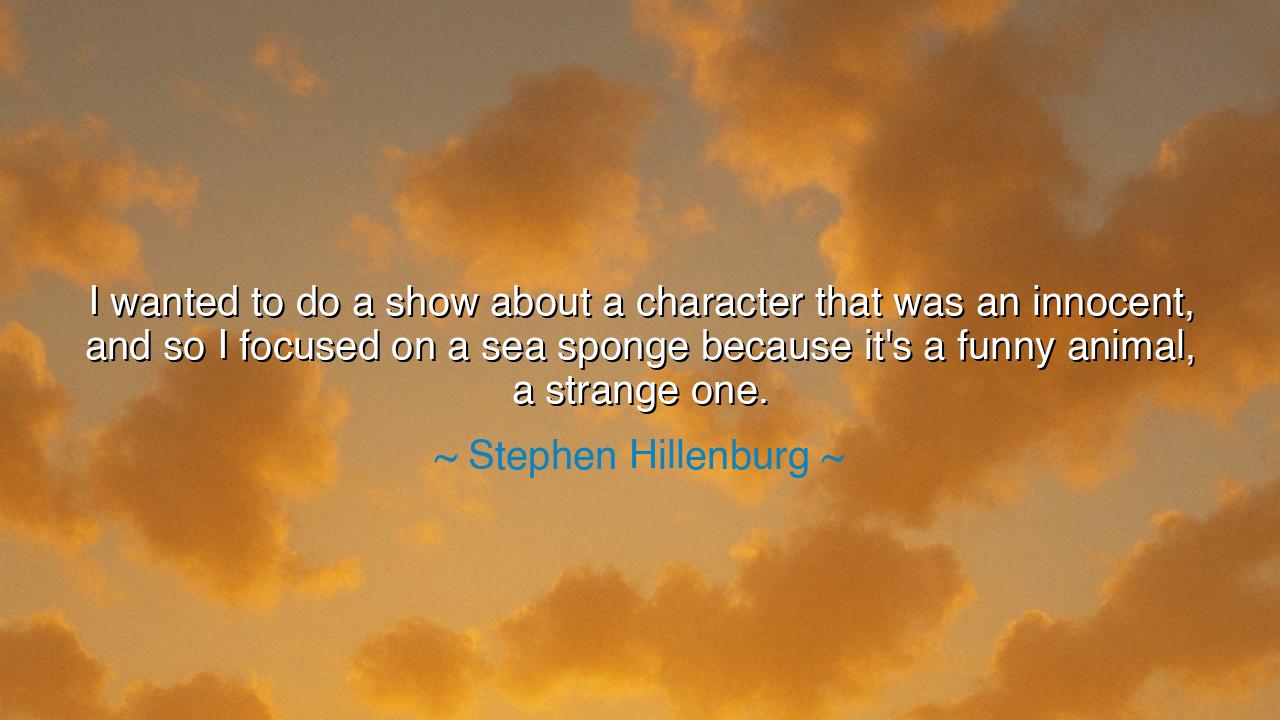
I wanted to do a show about a character that was an innocent, and
I wanted to do a show about a character that was an innocent, and so I focused on a sea sponge because it's a funny animal, a strange one.






“I wanted to do a show about a character that was an innocent, and so I focused on a sea sponge because it’s a funny animal, a strange one.” Thus spoke Stephen Hillenburg, the artist and marine biologist whose imagination gave birth to one of the most beloved creations of modern storytelling — SpongeBob SquarePants. His words, though gentle and unassuming, conceal a depth of insight that reaches far beyond animation. In this reflection, Hillenburg reveals an ancient wisdom: that the purest form of truth and laughter springs not from complexity, but from innocence, and that even the strangest creatures may become mirrors for the human soul.
The sea sponge, humble and motionless in the deep, is one of nature’s simplest beings. It feels no malice, holds no cunning, and yet it endures. By choosing such a creature as the vessel for joy and kindness, Hillenburg did what the wise have done since time immemorial—he raised the lowly to speak of the divine. For the ancients, the innocent fool was a sacred figure: the child, the dreamer, the one whose heart remains open even when the world grows cruel. Like the shepherd boy David, who faced Goliath not with power but purity, the innocent triumphs not through might, but through sincerity. So too does SpongeBob, the sponge of laughter, conquer cynicism with cheer.
Hillenburg’s vision recalls the mythmakers of old. When Aesop spun his fables, he gave voice to the beasts of the earth—foxes, lions, hares, and ants—so that through them, men might see their own nature reflected. In the same way, Hillenburg chose the ocean as his stage, and the sponge as his hero. It is no accident that he called the creature “funny” and “strange.” For in strangeness lies wonder, and in laughter lies understanding. The funny animal becomes philosopher and poet, teaching through delight. The laughter it brings is not shallow—it is the laughter of recognition, the ancient joy that reminds us what it means to be alive.
Yet this quote speaks not only of comedy, but of innocence as resistance. In an age hardened by irony and greed, Hillenburg’s sea sponge remained unguarded, generous, and sincere. The world mocked innocence as weakness, yet his creation proved otherwise: that purity of heart is a strength greater than cynicism. Just as Saint Francis of Assisi spoke to the birds and found holiness in simplicity, Hillenburg’s sponge found wisdom in childlike wonder. Through this “funny animal,” he declared that the soul need not grow dark to grow wise.
And consider, too, the strangeness he cherished. Many fear what is strange, and in fearing it, they lose sight of beauty. But Hillenburg, trained in marine science, saw wonder in the odd and overlooked. To him, the sea sponge was not absurd—it was miraculous. This is the mark of the true artist: to gaze upon what others dismiss and find in it the seed of greatness. The ancients called this the gift of seeing, the ability to perceive the divine spark hidden in the common clay. When Hillenburg chose the sponge, he did not merely choose a character—he chose a symbol of unseen life, of joy found in the depths.
From this story we learn that innocence, humor, and strangeness are not opposites of wisdom—they are its roots. The innocent heart sees clearly because it has not been clouded by judgment. The strange mind creates because it has not been shackled by conformity. And the funny soul teaches because it reminds us that even in absurdity, there is truth. When Hillenburg laughed at the idea of a talking sponge, he was not mocking life—he was celebrating it, as the ancients celebrated the laughter of the gods.
So let us carry this lesson, O seeker of meaning: do not fear being innocent, or strange, or funny. The world will always need those who can see wonder in the overlooked and hope in the ordinary. Build your creations, sing your songs, and share your laughter—not to impress, but to illuminate. Be like the sea sponge, absorbing the light of the world and reflecting it back as joy. For as Stephen Hillenburg taught through both word and work, sometimes the most powerful truths come dressed not in grandeur, but in giggles; not in solemnity, but in the shining, innocent wonder of the heart.






AAdministratorAdministrator
Welcome, honored guests. Please leave a comment, we will respond soon